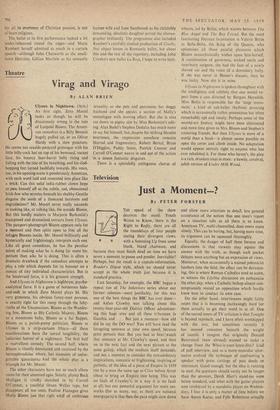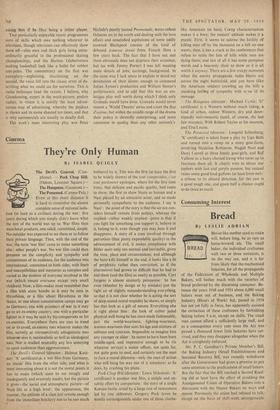Television
Just a Moment
By PETER FORSTER TIM speed of the show deceives the mind. Youth Wants to Know, there is the Right to Reply, there are all the roundelays of four people stating their divergent views, with a Summing Up from some blank, bland chairman, and because they must finish dead on time we have never a moment to pause and ponder. Inevitable? Perhaps, but the result is a capsule-information, Reader's Digest style, which we should never accept as the whole truth just because it is standard practice.
Last Saturday, for example, the BBC began a repeat run of The Inheritors series about our former colonies—most justifiably, for this was one of the best things the BBC has ever done— and Aidan Crawley was talking about this twenty-four-year-old District Officer administer- ing this huge area and all these tribesmen in Gambia and . . . But just a moment--how old did he say the DO was? You will have read the foregoing sentence at your own speed, because print permits that. But you had to hear /watch that sentence at Mr. Crawley's speed, and then on to the next fact and the next picture at the same gallop, which the medium itself demands, and not a moment to consider the extraordinary implications, romantic or frightening, inspiring or pathetic, of the idea of a piece of Empire in 1959 run by a man the same age as Clive before Arcot about to bring an Empire into being. This was no fault of Crawley's; in a way it is no fault at all; but one powerful argument for more net- works (for as many, say, as there are national newspapers) is that then the pace might slow down and allow more attention to detail, less general acceptance of the notion that one man's report on a situation tells us all there is to know. American TV, multi-channelled, does move more slowly. This can be boring, but, having more time, an argument can be squeezed thoroughly.
Equally, the danger of half these forums and discussions is that viewers may equate the answer with the truth, as though such pocket debates were anything but an expression of views. Moreover, when occasionally a trained polemicist lumbers into the field, the effect can be devastat- ing; this is where Roman Catholics tend to score, as witness the Lifeline discussion on euthanasia the other day, when a Catholic bishop almost con- temptuously routed an opposition which hardly knew how to conduct its own case.
On the other hand, interviewees might fairly retort that it is becoming increasingly hard for them actually to get their word in at all. One of the sacred tenets of TV criticism is that Tonight is beyond reproach, and I have often worshipped with the rest, but sometimes recently it has seemed comatose beneath the weight of laurels. 1 imagine that originally Donald Baverstock (now abroad) wanted to make a change from the What-is-your-latest-film? kind of puff interview, and as a more muscular alter- native evolved the technique of confronting a speaker with press cuttings of past deeds or utterances. Good enough, but the idea is running to seed; the questions should surely not be longer than the answers, Derek Hart's stand-ins were below standard, and what with the guitar players now reinforced by a mandolin player on Wednes- days, I fear it is only a matter of time before we have Anton Karas, and Fyfe Robertson actually asking him if he likes being a zither player.
Two particularly enjoyable recent programmes . were of skills which owe nothing whatever to television, though television can effectively show them off—slim men and thick girls being extra- ordinarily graceful in the professional skating championships, and the Harlem Globetrotters making basketball look like a ballet for rubber tent-poles. The commentary on the first was exemplary—explaining, elucidating; on the second, the voice fell into the classic error of de- scribing what we could see for ourselves. This is radio technique (and the reason, I believe, why Glendenning, expert in the word-picture, prefers radio); in vision it is merely the least adven- turous way of advertising, whereby the product is shown and its name shouted ten times, and that is why commercials are usually so deadly dull.
The week's most interesting play was Peter Nichols's poorly named Promenade, water-colour Osborne set in the north and dealing with the love affairs and unsatisfied aspirations of some oddly assorted Blackpool cousins of the 'kind of debased jeunesse doree from French films a few years back. The fact that I have not met them obviously does not disprove their existence, but (as with Jimmy Porter) I was left wanting more details of jobs, earnings, background. In the same way I lack space to explain in detail my detestation of their idiom; enough to commend Julian Aymes's production and William Stonor's performance, and to add that this was an am- bitious play well worth doing which 1 think only Granada would have done. Granada would never mount a 'World Theatre' series and court the flop d'estime, but within the middle range of the drama their policy is shrewdly enterprising, and more consistent in quality than any other network's















































 Previous page
Previous page